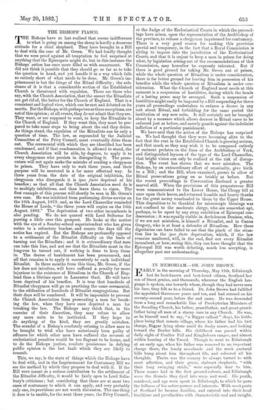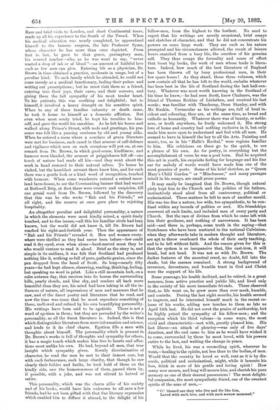IN MEMORIAM. — DR. JOHN BROWN. E ARLY in the morning of Thursday,
May 11th, Edinburgh lost its best-known and best-loved citizen, Scotland her son of finest genius, and thousands, wherever the English lan- guage is spoken, one towards whom, though they had never seen his face, they felt as to a friend. Dr. John Brown had fulfilled the appointed threescore years and ten, and had entered on his seventy-second year, before the end came. He was descended from a long and remarkable line of Presbyterian Ministers of the Seceding Church, his father, grandfather, and great-grand- father being all men of a stamp rare in any Church. He was, as he himself used to say, "a Biggar callant " (boy), his birth- place being that remote village, where his father had his first charge, Biggar lying alone amid its dusky moors, and looking toward the Border hills. His childhood was passed within daily sight of Coulter Fell and Kingledoors ranges, and almost within hearing of the Tweed. Though he went to Edinburgh at an early age, when his father was removed to an important charge there, the lonely moorlands and the meek pastoral hills hung about him throughout life, and coloured all his thoughts. Theirs was the scenery he always turned to with most affection, and their grave, stalwart shepherds, " with their long swinging stride," were especially dear to him. These scenes laid in the first ground-colours, and Edinburgh wove the threads they dyed into warp and woof. His youth, manhood, and age were spent in Edinburgh, to which he gave the fullness of his active powers and interests. With most parts of Scotland he became familiar, and entered into their local traditions and peculiarities with characteristic zeal and insight.
Rare and brief visits to London, and short Continental tours, made up all his experience to the South of the Tweed. When his medical education was nearly completed, he apprenticed himself to the famous surgeon, the late Professor Syme, whose character he has more than once depicted. From first to last, he gave to that grave, peremptory man, his revered teacher—who, as he was wont to say, " never wasted a drop of ink or of blood "—an amount of faithful love such as few men can give. Entering life as a physician, Dr. Brown in time obtained a practice, moderate in range, but of a peculiar kind. To each family which he attended, he could not come merely as a medical functionary, feeling their pulses and writing out prescriptions ; but he must visit them as a friend, entering into their joys, their cares, and their sorrows, and giving them the full sympathy of his most tender heart. To his patients, this was soothing and delightful; but to himself, it involved a heavy draught on his sensitive spirit. When to any of these families calamity or death came, he took it home to himself as a domestic affliction. But even when most sorely tried, he kept his troubles to him- self, and gave the world- his sunshine. As he left his house and walked along Prince's Street, with nods and greetings, his pre- sence was felt like a passing sunbeam by old and young alike. When he entered a room where a conclave of grave Directors were met for business, each cased in that armour of self-defence and vigilance which men on such occasions will put on, at one remark from Dr. Brown, in which good-sense, kindliness, and humour were blended, the armour of priggishness fell off—one touch of nature had made all kin—and they went about the work in hand restored to their natural selves. No house he visited, but the humblest servant there knew him, and for each there was a gentle look or a kind word of recognition, touched with humour. When some wanderers entered a retired moor- land farm-house, to see the Covenanting banner that had waved at Bothwell Brig, at first there were reserve and suspicion, till one genial word from Dr. Brown, followed by the discovery that this was he who wrote " Rab and his Friends," set all right, and the reserve at once gave place to rejoicing hospitality.
An altogether peculiar and delightful personality, a nature in which the elements were most kindly mixed, a spirit finely touched, and to fine issues,—all this his familiar circle had long known, but the world did not know it, till Dr. Brown had reached his eight-and-fortieth year. Then the appearance of "Rab and his Friends" revealed it. Men and women every- where were thrilled as they had never been before—few could read it dry-eyed, even when alone—hard-nerved must they be who would venture to read it aloud. Brief as the story is, and simple in its outlines, it was felt that Scotland had produced nothing like it, nothing so full of pure, pathetic genius, since the pen dropped from the hand of Scott. So long—nearly fifty years—he had kept silence, observing, reading, thinking, feeling, but speaking no word in print. Like a still mountain loch, on a calm autumn day, that receives into its bosom the surrounding hills, pearly clouds, and blue sky, and renders all back more beautiful than they are, his mind had been taking in all the in- fluences of nature, all impressions of men and manners that he saw, and of the finest poetry and literature that he read, and now the time was come that he must reproduce something of these, mellowed and refined by his own beautifying personality. His writings have been said to be egotistic. There is not a word of egotism in them ; but they are pervaded by the writer's personality, as all the finest literature is. Indeed, this is that which distinguishes literature from mere information and science, and lends to it its chief charm. Egotism fills a man with thoughts about himself. The personality which is present in Dr. Brown's works is full of thoughts and sympathy for others, it has a magic touch which makes him free to hearts and affec- tions most unlike his own. He had, beyond all men, that true insight which sympathy gives. Keenly discriminative of character, he read the men he met to their inmost core, but with such forbearance, such large charity, that though he saw clearly their foibles and faults, he took hold of these on the kindly side, saw the humorousness of them, passed them by, if possible, with a joke, and was not stirred to hatred or satire.
This personality, which was the charm alike of his society and of his books, would have lain unknown to all save a few friends, had he not been gifted with that fine literary expression which enabled him to diffuse it abroad, to the delight of his fellow-men, from the highest to the lowliest. No need to regret that his writings are merely occasional, brief essays and sketches of character, and that he did not concentrate his powers on some large work. They are such as his nature prompted and his circumstances allowed, the result of leisure hours snatched from a busy life, the overflow of his genuine self. They thus escape the formality and sense of effort that beset big books, the work of men whose trade is litera- ture. Indeed, how much of the best literature of England has been thrown off by busy professional men, in their few spare hours ! As they stand, those three volumes, which now contain all that he has left to the world, embalm whatever has been best in the life of Scotland during the last half-cen- tury. Whatever was most worth knowing in the Scotland of his time he knew,—he had seen Scott, knew Chalmers, was the friend of Thomas Erskine of Linlathen, and received his last words ; was familiar with Thackeray, Dean Stanley, and with Mr. Ruskin. Vernacular as his writings are, full of local in- cident and colouring, they are, at the same time, as broad and catholic as humanity. Whatever there was of beauty, or noble- ness, or truth anywhere, he freely welcomed it. His strong love of home and country had nothing exclusive in it, but only made him more open to understand and feel with all men. He seemed to have in himself the key to all the Arts. Painting and music, too, as in his " Halle's Recital," were regions familiar to him. His criticisms on these go to the quick, to use a phrase of his own. As for poetry, in everything but the accomplishment of verse he was a poet born. Had he acquired this art in youth, his exquisite feeling for language and his fine ear for melody of words would have made him one of the most genuine of poets. Some of his brief sketches, as "Queen Mary's Child Garden " or " Minchmoor," and many passages inlaid in his essays, are small prose poems.
It may easily be imagined that Dr. Brotvn, though natural piety kept him to the Church and the politics of his fathers, instinctively stood aloof from all controversy, political or ecclesiastical. These matters he left to men of another mould. His was too fine a nature, too wide, too sympathetic, to be con- fined within any bounds of politics or sect. His friendships overwent all such limits, and included men of every party and Church. But the race of divines from which he came left with him their goodness, and nothing of narrowness. It has been said—and there is, perhaps, some truth in the saying—that Scotchmen who have been nurtured in the national Calvinism, when they afterwards take in modern thought and literature, are apt to throw overboard the whole of their early teaching, and to be left without faith. And the reason given for this is that the system is so inexpansive that, like cast-iron, it will break, but not bend. It was not so with Dr. Brown. The darker features of the ancestral creed, no doubt, fell into the shade, but the essence remained. A strong background of reverence, devoutness, and humble trust in God and Christ were the support of his life.
Some years ago, his health declined, and he retired, in a great measure, from active practice and public life, and lived only in the society of his more immediate fri ends. These observed that, as life went on, he grew more than ever meek, humble, and contrite. During the last eight months, his health seemed to improve, and he interested himself mach in the recent re- issue of his works, adding new touches to them as late as April 12th last. He did not covet the praise of authorship, but he highly prized the sympathy of his fellow-men ; and the reception which his third volume—in some ways, the most vivid and characteristic—met with, greatly pleased him. His last illness—an attack of pleurisy—was only of five days' duration, and the end came to him as he would have wished it to come, surrounded by those he most loved, with his powers entire to the last, and waiting the change in peace.
While he lived, his was a reconciling spirit, wherever he went,—healing to the spirits, not less than to the bodies, of men. Would that the country he loved so well, rent as it is by dis- cords, political and ecclesiastical, might, while it laments his loss, drink in more of his gentle and loving spirit ! How many now mourn, and long will mourn him, and cherish his pure memory as one of their dearest possessions ! The most delight- ful companion, the most sympathetic friend, one of the sweetest spirits of the sons of men,-
" 0 ! blessed are they who live and die like him,
Loved with such love, and with such sorrow mourned."

































 Previous page
Previous page